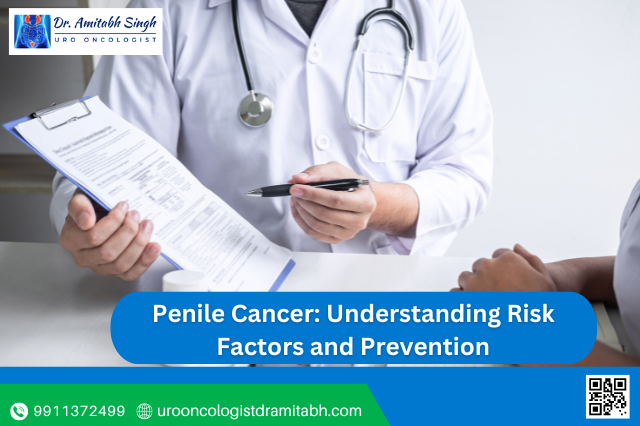- April 17, 2024
- By: oncologistdramitabh
Penile cancer is a rare but serious condition that can have a significant impact on men’s health and
well-being. Understanding the risk factors associated with penile cancer and adopting appropriate
prevention measures are important steps in reducing the chances of developing this disease. In this
article, we will discuss the various risk factors for penile cancer and explore effective prevention
strategies.
Penile Cancer Risk Factors:
Age: It is a significant risk factor for penile cancer, with the incidence of this disease being more
prevalent among older individuals. As men age, the cells in the penis undergo changes that may
increase susceptibility to cancerous mutations. Additionally, cumulative exposure to other risk factors
such as smoking, poor hygiene practices, and certain medical conditions can contribute to the
development of penile cancer.
Smoking: It is another notable risk factor for penile cancer due to the carcinogens present in tobacco.
These harmful substances can cause DNA damage, increasing the likelihood of cancerous cell growth
in the penis.
HIV/AIDS: which weakens the immune system, can make the body more susceptible to various health
conditions, including cancer. In individuals with HIV/AIDS, the body may struggle to identify and attack
cancerous cells, thereby increasing the risk of penile cancer.
Phimosis: Phimosis is a condition in which the foreskin of the penis cannot be retracted back over the
glans, which is the head of the penis. This condition is normal in infants and young children, and the
foreskin usually becomes more retractile as they grow older.
Multiple sexual partner: More sexual partners mean a higher risk of penile cancer. That’s because it
raises the chance of getting HPV, an infection linked to cancer.
Premalignant condition: A premalignant condition is like a red flag warning that something in your
body could turn into cancer if you don’t take care of it. It’s not cancer yet, but it could become cancer if
you don’t get the right treatment.
Prevention:
Circumcision: the surgical removal of the foreskin, is a preventive measure that can significantly
reduce the risk of penile cancer. Circumcision helps to decrease smegma accumulation, a known risk
factor for penile cancer.
Maintaining good personal hygiene: particularly with regard to genital health, is paramount for penile
cancer prevention. Proper hygiene practices can help prevent smegma buildup and reduce the
likelihood of conditions such as phimosis, thus lowering the risk of cancer development.
Healthy Lifestyle: Adopting a healthy lifestyle can also play a crucial role in preventing penile cancer.
Thisincludesrefraining from tobacco use, practicing safe sexual behaviours, paying attention to penile
hygiene, and adopting a balanced diet and regular exercise regimen.
Conclusion:
Penile cancer is a serious condition that requires proactive measuresfor prevention. By understanding
the various risk factors associated with penile cancer and adopting appropriate preventive measures,
individuals can reduce their risk of developing this disease. Schedule an appointment for the Best Online Doctor Consultation to take the first step towards comprehensive and personalized penile
cancer treatment.


